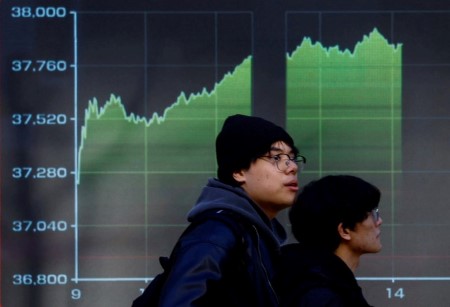




Policy Rate Updates: BSP outlook — cloudy with a chance of rate cut
 DOWNLOAD
DOWNLOAD

January Economic Update: Growth slows, prices rise
 DOWNLOAD
DOWNLOAD

Inflation Update: Up, up, and away?
 DOWNLOAD
DOWNLOAD


Japanese consumers, Aussie CPI in focus

Japanese consumer confidence and Australian inflation are the main points of focus for markets in Asia on Wednesday, as investors ponder the broader implications of a widespread rise in bond yields.
US Treasury yields, the benchmark for global borrowing costs, rose to four-week highs on Tuesday in the wake of a weak US debt auction, leading to a mixed performance on Wall Street.
The Dow fell, the S&P 500 was flat and Nvidia’s extraordinary rally powered the Nasdaq to a fresh record high – shares in the AI poster child have soared 20% in the last three trading days and the firm is now worth USD 2.8 trillion.
But Asian markets on Wednesday may be more sensitive to the tightening of financial conditions from US yields than the US tech boom. Some analysts reckon the 10-year Treasury yield may now be entering a higher range of 4.50% to 4.70%, and the two-year yield is knocking on the door of 5.00% again.
Closer to home, Japanese Government Bond yields are also under renewed scrutiny. Yields are making new multi-year highs across the curve, prompting a flurry of comments from Japanese and global officials in recent days.
The 10-year JGB yield rose for an eighth straight day on Tuesday to hit a fresh 12-year high of 1.035%, and the 2-year JGB yield inched up to a new 15-year peak of 0.36%.
Bank of Japan Governor Kazuo Ueda on Saturday said the bank’s ‘basic stance’ is that long-term bond yields should be set by markets. But this is difficult for the BOJ, which has for years been hoovering up JGBs in its battle against deflation and now owns more than 50% of the entire market.
Higher bond yields raise the BOJ’s interest bill. A lot.
On the other hand, higher JGB yields could support the yen, which officials would probably welcome – Japan’s finance minister on Tuesday said he was more concerned about the downside of a weak exchange rate right now, namely the increased burden on companies and consumers from higher import prices.
Do JGB yields take a breather here? BOJ data on Tuesday sent out mixed signals on inflation – corporate services prices are rising at their fastest pace since 2015, but other data show key measurements of underlying inflation falling below the bank’s 2% target for the first time since August 2022.
If ‘higher for longer’ JGB yields boost the yen, Japan Inc. could feel the squeeze. The weak currency has attracted huge foreign investor flows into Japan, but with further ‘material’ weakness no longer likely, HSBC strategists are closing their overweight position in Japanese equities.
Here are key developments that could provide more direction to markets on Wednesday:
– Australia inflation (April)
– Japan consumer confidence (May)
– IMF’s Gita Gopinath briefs media following IMF’s annual assessment of the Chinese economy
(Reporting by Jamie McGeever; Editing by Josie Kao)
This article originally appeared on reuters.com





 By Reuters
By Reuters